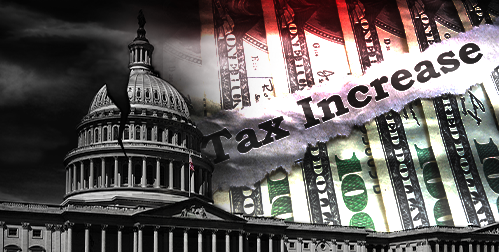Inflation Reduction Act Raises Taxes
Democrats hail their Inflation Reduction Act. They say it will lower skyrocketing inflation. They also say it does not break Biden’s campaign pledge not to raises taxes on those earning less than $400,000 a year. Neither statement is exactly true.
The bill does not introduce a direct tax that will appear on your next tax return. But indirectly, it will raise taxes on middle income families.
The bipartisan Joint Committee on Taxation (JCT) researched the Act. They say there will be a tax increase on all wage brackets. Those with incomes below $200,000 would pay almost $17 billion in combined extra taxes in 2023.1
Republican Senator Crapo commissioned the JCT. He said, “Americans are already experiencing the consequences of Democrats’ reckless economic policies. The mislabeled ‘Inflation Reduction Act’ will do nothing to bring the economy out of stagnation and recession, but it will raise billions of dollars in taxes on Americans making less than $400,000.”2
The JCT explained the indirect tax increase. Corporate taxes get passed onto consumers and workers. It especially targets holders of retirement funds. A taxpayer may hold shares of company in their pension or investment portfolio. An increase in corporate taxes can reduce share value and lower dividends. Thus, shrinking the value of their fund.
Additionally, capital investment can fall if returns shrink. As a result, companies may need to fire people or reduce wages and raise prices. The JCT concludes that your direct tax bill may not go up. But your spending power will diminish.
The Act Will Not Reduce Inflation
Many sources that say the bill will not reduce record inflation. The nonpartisan Congressional Budget Office said, “In calendar year 2022, enacting the bill would have a negligible effect on inflation, in CBO’s assessment.” They estimate the bill will raise over $450 billion from new taxes.3
The University of Pennsylvania’s Wharton School of Business studied the bill. They expressed “low confidence that the legislation will have any impact on inflation”. Penn found the bill may actually cause inflation to increase during its early years. A similar study from Moody’s found the bill will only “modestly reduce inflation” spread over 10 years.4
A group of 230 economists warned that the legislation will increase inflation. The economists wrote in a letter that the U.S. economy is at a “dangerous crossroads.” And the “inaptly named ‘Inflation Reduction Act of 2022’ would do nothing of the sort and instead would perpetuate the same fiscal policy errors that have helped precipitate the current troubling economic climate.”5
The White House used some twisted logic to defend calling it an inflation reducing bill. The legislation will reduce the price of some prescription drugs. It may also bring down gas prices over a long period of time. Inflation is a year-over-year measure of price increases. Since some prices are going down, inflation is going down. Thus, the bill’s name is appropriate.
Experts on both sides of the aisle agree that the bill will bring no immediate relief from inflation. Even the reductions in fuel and drug prices won’t kick in for a few years. Instead, the government is trying to take out all the money they pumped into the economy with new taxes.
Only the Federal Reserve has any real chance of stopping inflation. They are trying to do this with aggressive interest rates. And after recent jobs data, economists warn Americans to brace for even more rate hikes. In the face of this warning, the price of gold continues to climb. It is a proven safe haven against inflation and interest rate increase. Contact us today to learn how a Gold IRA can protect your retirement from wealth destroying legislation.






